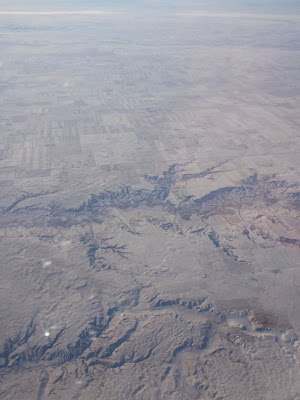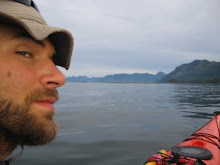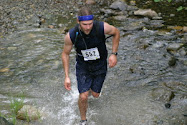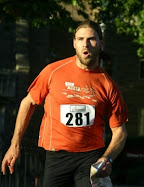I just got back from a great weekend of orienteering in some of the best terrain in the Province. The desert terrain in and around the Kamloops area is simply awesome. Here on the coast, the forest is so thick that it inhibits your route choices significantly. So often, it is easier to run four or more times the distance on a trail than to do a short bushwack. In Kamloops, it is a different story. The terrain is so open that you can take virtually any route option you want. With so many choices, it becomes a matter of picking the best overall route, and also the micro route choices you make along the way. Contour reading at its best.
I drove up with Kim on the Saturday morning who I had not seen in over two weeks as she was out in the field doing some seafloor mapping. So, we decided to spend a nice weekend together up at Sun Peaks resort. We rented a nice quaint condo with a private hot tub that saw a lot of use. Ahhhh, the luxury of the hot tub!
I've been on the down swing in terms of racing and had several goals in mind for the weekend's events: don't make mistakes, race smart, stay in-touch with the map, read ahead, make good route choices. These may all seem to be goals that you would strive for at any orienteering event but man are they hard to achieve. The biggest problem that new orienteers have, and I include myself in this category, is to run too hard, lose track of your position and make mistakes. It is so hard when racing to slow down, stay in-touch with the map, and race smart.
I've made some good progress since getting into this sport less than two years ago, yet I still find it extremely hard to not get ahead of myself. This time however, I was going to keep everything under control.
Orienteering is such a complex sport. It may seem pretty easy at first (you take a map and compass, take a bearing and whoever can run faster will win) but it is far from that. I have found that this sport takes years to get good at and a lifetime to master. Sure, you can get by with basic map reading skills but there are some key mental tasks that, if carried out, will separate you from the rest of the pack.
Read ahead
Good orienteers will have their general entire route planned after the first few controls. This doesn't mean that they have planned all the micro route choices that need to be made; it just means that they get a general feel for the course and have spotted major features that can either help or hinder their progress.
Pinpoint the Control
Another technique that experienced orienteers possess is reading the control descriptions ahead of time and planning a proper attack into the control. This means that they'll know already know exactly where the control will be placed and will save time by approaching it properly. For example, if the control is hung at the bottom of a cliff, and you know it's at the bottom because you read ahead, you'll make sure that your approach doesn't cliff you out from the top. Good orienteers will also slow up slightly as they approach a control so that they accurately find the control and waste no time backtracking.
There are many more techniques that can be used, but these are two that I really wanted to work on.
The Sprint
The first event was a sprint event at Thomson Rivers University (TRU) located right in Kamloops. I was not at all set on hammering it out on the asphalt and concrete of the campus but nonetheless, did a little warmup and hit the finish line calm, relaxed, and focused on my goals. I was off before I knew it and instead of the typical 'sprint' to the first control, I took it down a notch, got into the map, and actually started planning out where I would go after I hit the first control. The first control was actually a little tricky as it was tucked in a little corner of a building so you had to be careful not to miss it. I slowed up when coming close, quickly found it and was off on the next leg. I ended up making a small mistake going to the next control, was able to quickly recover, and planned out my next few controls on the fly.
I was never able to fully plan my route but did manage to read at least two controls ahead which helped in noticing key features that had to be identified (a flight of stairs was the only way up to one of the controls and, if missed, would have you wasting time by running around the building).
My race was going well until just after the midway point and started to slow down on a long leg across the campus. I was starting to suffer but kept telling myself that it would be over soon. A few more controls, some good route choices, and a sprint into the finish and I was done. While I was quite winded, I thought I had a good smart race. Had I been more trained for this type of event, I know I could have done much better as I could have held a higher pace while still being able to stay in the map. In the end, I was suprised to be in 4th place beating out some National Orienteering team members. Not only that, I was only 10 seconds out of 3rd place! Damn it! If only I had pushed a little harder....
Middle Distance
The Middle distance did not go quite as well for me. I had a good start to the event but aroudn the 4th control, I was surrounded with other racers who influenced my route choice and caused me to make my first big mistake. Rule #1 in orienteering: never follow anyone or trust where someone else is going. Why? Because they might not know where they're going or might be on a different course. I really prefer to not have anyone else around but it happened, I made a small mistake and continued strong hitting control after control.
What happened next was the turning point in the race for me. I hit a road, could have easily took it to the next control, but decided to stright line it through some thicker brush. This was a mistake. The brush funnelled me off my intended route and ended up spitting me out further down than I had wanted to come out. While I didn't lose much time, I lost some gumption. When you lose some of your gumption, it always takes a control or two to get it back. In the meantime, your more vulnerable to mistakes. I was getting tired, was vulnerable and made a bad route choice again (again straight lining my route rather than going longer but over better terrain). The mistakes just compounded until I hit the last few easier controls into the finish. While it was not a good race for me, it was an important learning experience.
Long Distance
The long event was just that. 12.2 km stright line with over 500m of elevation gain. I was feeling a little drained from the other events and really just wanted to do a smart race where I was as strong in the beginning, as the middle, as the end. I held a decent pace, walked the steep hills and made mostly good route choice decisions. The more experienced racers put some good time into me just like in the middle distance. However, I learned a lot from the long event just as in the middle distance.
When looking at my small mistakes and route choices, my time would have been much closer to the elite orienteers and shows me that while I could stand to be a little faster on my feet, that my real challenge is to become a better orienteer. And that's what this weekend was all about.
Thanks to Magnus at GVOC for setting up some great courses and for everone who helped out with the events. Great job!





 Fortunately for me, we got a good snowfall in Victoria two weekends ago but I spent much of it driving to and from Seattle to partake in the BEAST race. So, I booked a plane ticket and was exited to visit my family back in Stratford and enjoy the crisp cold air and the good ol white stuff hung on the trees.
Fortunately for me, we got a good snowfall in Victoria two weekends ago but I spent much of it driving to and from Seattle to partake in the BEAST race. So, I booked a plane ticket and was exited to visit my family back in Stratford and enjoy the crisp cold air and the good ol white stuff hung on the trees. 
 The weather was perfect for snow; about -3 to -5 degrees and about 4 inches of snow. I went on two ~15km runs with the highlights being the lake run, queens park, and of course, the beautiful cemetary and old grove park.
The weather was perfect for snow; about -3 to -5 degrees and about 4 inches of snow. I went on two ~15km runs with the highlights being the lake run, queens park, and of course, the beautiful cemetary and old grove park. 






 After a windy crossing on the BC Ferries boat, I arrived late at the Tsawwassen terminal where Gary was waiting for me. We loaded my gear quickly and were off in blowing snow conditions. It didn't take us long to discuss whether or not the race was even going to be held if the snow continued. We budgeted for a least a 1/2 hour at the boarder crossing but were not going to be suprised if we had to wait for several hours; this has been due lately to the savings-crazed Canadian shoppers tring to save a buck in the US (by spending an entire day of their lives driving and spending money on gas!). I wasn't too concerned but Gary has an issue with not getting aggressive back to the US boarder guards whose job it is to make you feel like shit. So, with a plan to just be calm and be non-reactive we pulled up to the booth with no line-ups.
After a windy crossing on the BC Ferries boat, I arrived late at the Tsawwassen terminal where Gary was waiting for me. We loaded my gear quickly and were off in blowing snow conditions. It didn't take us long to discuss whether or not the race was even going to be held if the snow continued. We budgeted for a least a 1/2 hour at the boarder crossing but were not going to be suprised if we had to wait for several hours; this has been due lately to the savings-crazed Canadian shoppers tring to save a buck in the US (by spending an entire day of their lives driving and spending money on gas!). I wasn't too concerned but Gary has an issue with not getting aggressive back to the US boarder guards whose job it is to make you feel like shit. So, with a plan to just be calm and be non-reactive we pulled up to the booth with no line-ups. 
 At this point, I think both of us were hoping that it WOULD be cancelled so that we wouldn't have to go out into the wet and snowy conditions. Gary, who is sensitive to the cold, was not looking very anxious. Fortunately for us, lots of other crazy adventure racers had showed up and quickly changed our minds into thinking that going out into slushy snow and rain to do a race was a completely normal and ok thing to do. The race was definitely a go. Team Dart/Nuun members Ryan Van Gorder and Aaron Rinn came out as part of a teaching type position for newer teams. I think this is a great idea and way to help teach new adventure racers and hopefully rub off some of their years of experience to them.
At this point, I think both of us were hoping that it WOULD be cancelled so that we wouldn't have to go out into the wet and snowy conditions. Gary, who is sensitive to the cold, was not looking very anxious. Fortunately for us, lots of other crazy adventure racers had showed up and quickly changed our minds into thinking that going out into slushy snow and rain to do a race was a completely normal and ok thing to do. The race was definitely a go. Team Dart/Nuun members Ryan Van Gorder and Aaron Rinn came out as part of a teaching type position for newer teams. I think this is a great idea and way to help teach new adventure racers and hopefully rub off some of their years of experience to them.
 Soaked and Frozen
Soaked and Frozen Also, a big no thanks to whoever made the BC Ferries bomb threat and screwed up the schedule so that I was an hour later in getting home.
Also, a big no thanks to whoever made the BC Ferries bomb threat and screwed up the schedule so that I was an hour later in getting home.

.JPG)
.JPG) The water was glass.
The water was glass..JPG) D'Arcy Island is part of the
D'Arcy Island is part of the .JPG)

















